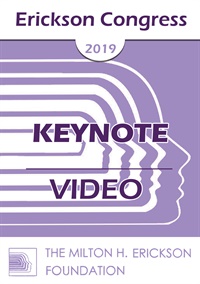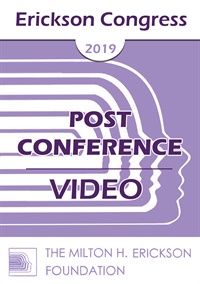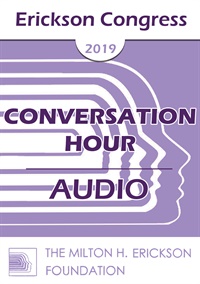
- Average Rating:
- Not yet rated
- Topic Areas:
- Conversation Hours | Psychotherapy | Brief Therapy | Strategic Therapy | Utilization
- Categories:
- Erickson Congress | Erickson Congress 2019
- Faculty:
- Eric Greenleaf, PhD
- Duration:
- 59 Minutes
- Format:
- Audio Only
- Original Program Date:
- Dec 13, 2019
- Short Description:
- Participants will discuss the place of emotional expression in the conduct of modern brief, strategic and hypnotic psychotherapies.
- Price:
- $15.00 - Base Price
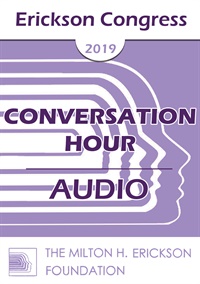
- Average Rating:
- Not yet rated
- Topic Areas:
- Conversation Hours | Genomics | Brief Therapy | Psychotherapy | Neuroscience
- Categories:
- Erickson Congress | Erickson Congress 2019
- Faculty:
- Kathryn Rossi, PhD
- Duration:
- 58 Minutes
- Format:
- Audio Only
- Original Program Date:
- Dec 14, 2019
- Short Description:
- Great strides have been made in PsychoSocial Genomics as well as the placebo effects in psychotherapy. We will share our views of how these new state-of-the-arts sciences can gently be integrated into psychotherapy sessions and improve outcomes.
- Price:
- $15.00 - Base Price
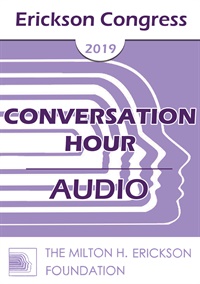
- Average Rating:
- Not yet rated
- Topic Areas:
- Conversation Hours | Ericksonian Hypnosis and Therapy Techniques | Gender | Masculinity | Psychotherapy
- Categories:
- Erickson Congress | Erickson Congress 2019
- Faculty:
- Rick Miller, MSW
- Duration:
- 54 Minutes
- Format:
- Audio Only
- Original Program Date:
- Dec 14, 2019
- Short Description:
- Learn Ericksonian principals for encouraging men to participate and enjoy psychotherapy. Utilize strategies for dealing with their own biases regarding difficult men. Expand definitions of healthy masculinity.
- Price:
- $15.00 - Base Price
- Average Rating:
- Not yet rated
- Topic Areas:
- Keynotes | Psychotherapy | Therapist Development
- Categories:
- Erickson Congress | Erickson Congress 2019
- Faculty:
- Scott Miller, PhD
- Course Levels:
- Master Degree or Higher in Health-Related Field
- Duration:
- 50 Minutes
- Format:
- Audio and Video
- Original Program Date:
- Dec 12, 2019
- Short Description:
- What can mental health professionals do to enhance their performance? Available evidence makes clear that clear that attending a typical continuing education workshop, specializing in the treatment of a particular problem, or learning a new treatment model does little to improve effectiveness. In fact, studies to date indicate clinical effectiveness actually declines with time and experience in the field.
- Price:
-
Sale is $29.00
price reduced from Base Price - $59.00
- Average Rating:
- Not yet rated
- Topic Areas:
- Keynotes | Psychotherapy | Generative Psychotherapy | Art and Creativity | Relationships
- Categories:
- Erickson Congress | Erickson Congress 2019
- Faculty:
- Robert Dilts, BA
- Course Levels:
- Master Degree or Higher in Health-Related Field
- Duration:
- 1 Hour 4 Minutes
- Format:
- Audio and Video
- Original Program Date:
- Dec 13, 2019
- Short Description:
- The core focus in Generative Change is creativity: How do you create a positive relationship with others and yourself—your body, your past, your future, your wounds, and your gifts? To accomplish this, a person’s state of consciousness is the difference that makes the difference. Generative Change work involves building the generative states, for yourself and others, needed to make significant change. It then focuses on how to maintain these states in order to reach meaningful goals and transform challenging obstacles. This presentation will explore how the six steps of Generative Change may be applied to Psychotherapy.
- Price:
-
Sale is $29.00
price reduced from Base Price - $59.00
- Average Rating:
- Not yet rated
- Topic Areas:
- Master Classes | Ericksonian Psychotherapy | Psychotherapy | Brief Therapy | Hypnotherapy | Self-Relations | Utilization
- Categories:
- Erickson Congress | Erickson Congress 2019
- Faculty:
- Bill O'Hanlon, MS | Jeffrey Zeig, PhD
- Course Levels:
- Master Degree or Higher in Health-Related Field
- Duration:
- 4 Hours 49 Minutes
- Format:
- Audio and Video
- Original Program Date:
- Dec 16, 2019
- Short Description:
- Ericksonian hypnotherapy and the Self-Relations approach are experiential methods of change. In combination they can be synergistic. Psychotherapy is best when clients have a first-hand experience of an alive therapeutic process. Such dynamic empowering experiences pave the way for dynamic understandings. Bill O’Hanlon and Jeffrey Zeig will engage with each other and the participants to examine commonalities and differences in their work.
- Price:
- $59.00 - Base Price
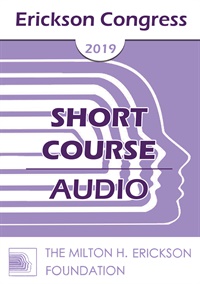
- Average Rating:
- Not yet rated
- Topic Areas:
- Short Courses | Ericksonian Hypnosis and Therapy Techniques | Psychotherapy
- Categories:
- Erickson Congress | Erickson Congress 2019
- Faculty:
- Abraham Hernández Covarrubias
- Duration:
- 1 Hour 26 Minutes
- Format:
- Audio Only
- Original Program Date:
- Dec 12, 2019
- Short Description:
- Erickson was known by the efficiency of his treatments and how he was able to quickly treat difficult patients. He used different strategies and techniques with a unique style. However, he did not create a systematization of his strategies.
- Price:
- $15.00 - Base Price
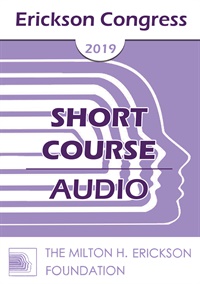
- Average Rating:
- Not yet rated
- Topic Areas:
- Short Courses | Communication | Psychotherapy | Ericksonian Hypnosis and Therapy Techniques | Hypnosis
- Categories:
- Erickson Congress | Erickson Congress 2019
- Faculty:
- Susan Pinco, PhD
- Duration:
- 1 Hour 16 Minutes
- Format:
- Audio Only
- Original Program Date:
- Dec 12, 2019
- Short Description:
- Like much that is deeply imbedded and emergent in our psyches, the mastery of Milton Erickson often defies a simple explanation. Words may be descriptive but fall short of unpacking the exquisite intricacy of his work. With currents as deep as this it has taken years for Jeff Zeig, one of Erickson’s students, to come up with the potent phrase “Limbic Communication” to describe that crucial element that underpins the art and artistry of Erickson and all impactful experiential therapy.
- Price:
- $15.00 - Base Price
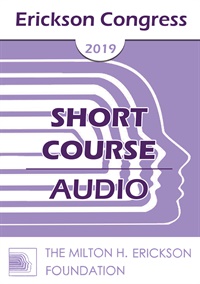
- Average Rating:
- Not yet rated
- Topic Areas:
- Short Courses | Utilization | Psychotherapy | Ericksonian Hypnosis and Therapy Techniques | Hypnosis | Genomics | Cancer
- Categories:
- Erickson Congress | Erickson Congress 2019
- Faculty:
- Mauro Cozzolino, PhD | Giovanna Celia, PhD
- Duration:
- 1 Hour 26 Minutes
- Format:
- Audio Only
- Original Program Date:
- Dec 12, 2019
- Short Description:
- In this course, we are going to illustrate how Erickson’s classic Utilization principle can be translated into chrono-bio-genomic terms. For a long time now, we have known that this principle lies at the basis of Erickson’s amazing ability to facilitate the natural self-healing, growth and evolution processes that every patient possesses inside. To date, only few therapists have integrated the chro-bio-genomic dimensions that are inherent in the Utilization principle, in their clinical practice.
- Price:
- $15.00 - Base Price
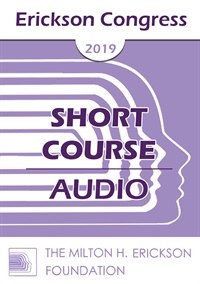
- Average Rating:
- Not yet rated
- Topic Areas:
- Short Courses | Art and Creativity | Attunement | Improvisation | Psychotherapy
- Categories:
- Erickson Congress | Erickson Congress 2019
- Faculty:
- Paul Leslie, Ed.D.
- Duration:
- 1 Hour 11 Minutes
- Format:
- Audio Only
- Original Program Date:
- Dec 12, 2019
- Short Description:
- In this training you will learn the factors which lead to creating alive and inspired therapy sessions regardless of theoretical orientation. Drawing from such diverse sources as indigenous wisdom traditions and modern psychotherapy approaches, this training will demonstrate how embracing improvisation and utilization can revitalize and energize therapy sessions.
- Price:
- $15.00 - Base Price
Please wait ...



